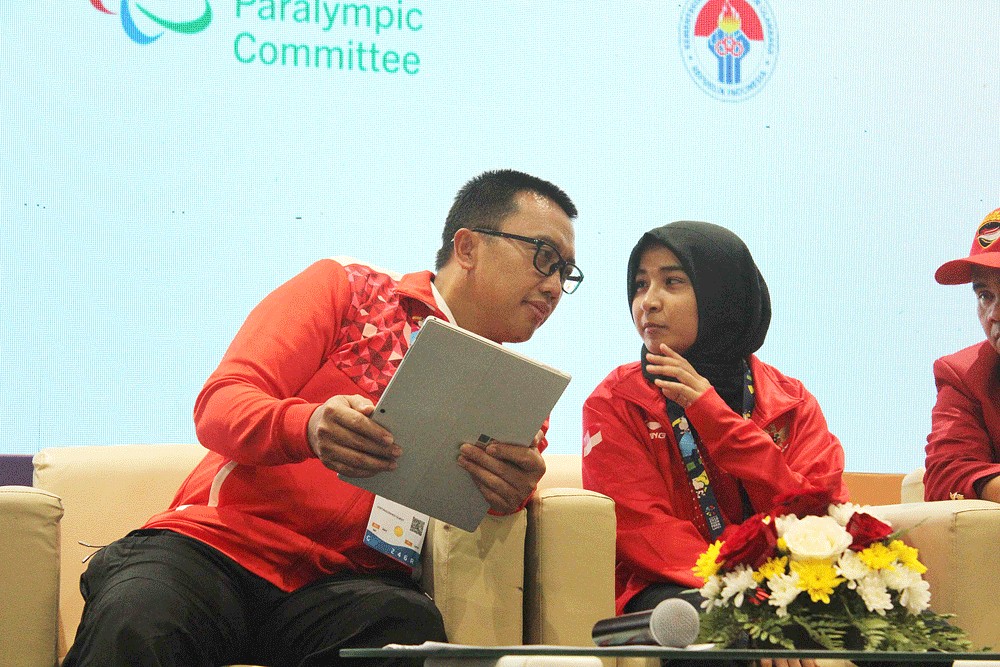Asian Para Games: Indonesian judoka out after 'wanting to break' rule by wearing hijab
Indonesia’s ambition to collect as many medals as it can has been ironically tainted by the failure of several para athletes to compete, because of the national team’s lack of understanding of rules and regulations.
Change Size
 Disqualified: Youth and Sport Minister Imam Nahrawi (left) talks with blind judoka Miftahul Jannah during a press conference at Jakarta’s Gelora Bung Karno (GBK) Stadium on Tuesday. (The Jakarta Post/Charisa Vanessa G)
Disqualified: Youth and Sport Minister Imam Nahrawi (left) talks with blind judoka Miftahul Jannah during a press conference at Jakarta’s Gelora Bung Karno (GBK) Stadium on Tuesday. (The Jakarta Post/Charisa Vanessa G)
I
ndonesia’s ambition to collect as many medals as it can has been ironically tainted by the failure of several para athletes to compete, because of the national team’s lack of understanding of rules and regulations. The National Paralympics Committee (NPC) and the Indonesian Asian Para Games Organizing Committee (INAPGOC) have admitted such recklessness.
On Monday, visually impaired Indonesian judoka Miftahul Jannah was disqualified from the competition after she refused to take off her hijab, since head coverings may not be worn during competitions, according to International Judo Federation (IJF) regulations.
While other martial arts, such as karate and taekwondo, allow Muslim female athletes to wear a special hijab during a competition, judo does not. IJF Refereeing Rules Article 4 Number 4 says that the head of the judoka shall not be covered, except for bandaging of a medical nature.
Miftahul’s coach, Ahmad Bahar, said he had been aware of the regulation and therefore had lobbied the Games organizer to let Miftahul wear her hijab, but to no avail. The organizer, represented by the International Blind Sports Federation (IBSA), refused to grant the request, referring to the prevailing IJF rules.
“We have tried our best to accommodate Miftah’s principle [to wear a hijab while competing], but we have to respect IJF rules,” Ahmad told a press conference on Tuesday.
He said he hoped in the future the IJF could adjust its rules by letting Muslim female athletes wear special hijab, for instance ones made of rubber. The hijab would still cover the athletes’ hair but not their necks, Ahmad said.
However, Ahmad was tight-lipped when asked further about his efforts to negotiate the rules or look for alternatives to the hijab during the period of preparation for the Games.
Meanwhile, Miftahul said she knew about the IJF rule but had insisted on wearing her hijab while fighting.
“I want to break that [rule]. I want to challenge the rule, because I want to stick to my principle,” she said.
When asked about her future career, Miftahul said she would not stop being an athlete who fights for her country, so she would switch to chess, a game she has excelled at since she was a child.
Miftahul said she decided to commit to the change because she refused to compete as a judoka without a hijab.
Youth and Sports Minister Imam Nahrawi said he appreciated Miftahul’s motive. He said the ministry would follow up the case and suggest that the judo federation relax the rules to let Muslim women wear a hijab that is safe to be worn during the competition.
Imam added the ministry would assess the incident to prevent something similar from happening in the future.
“Next time, before competing, we have to know about the detailed results of technical meetings and the rules so that we won’t disappoint the athletes and people who want to see them competing,” Imam said.
That was the second incident in which a judoka was banned because of wearing a head cover, after the 2012 London Summer Olympics, Imam said.
During the Olympics, judoka Wojdan Shaherkani from Saudi Arabia was banned from wearing a head scarf during the competition, much to her dismay.
After a negotiation conducted by her father and the committee, she was allowed to compete wearing a tight-fitting, cap-style covering.
Commenting on this, NPC chief Senny Marbun noted that the ban should not be viewed as an act of discrimination, as any type of head cover was prohibited because of safety concerns.
Some judo maneuvers might choke an athlete wearing a head cover, in this case, a hijab, he said. The risk could be twice as high in this case, since the athletes competing in the Para Games had visual impairments, he said.
In another disappointment on Monday, the Indonesian men’s para swimming team failed to compete in the 4x100 relay because the manager had forgotten to register the team before the game.
Team coach Handoko Purnomo admitted the mistake, adding that INAPGOC had set strict rules about the registration process.
The error happened because the team had focused on registering two swimmers that had yet to be included on the list of athletes to compete that day.
“We faced [such] problems registering those two swimmers that we were late to register the relay team […]; we forget to register them, as we were occupied with that problem,” Handoko said on Monday.
INAPGOC promised a thorough evaluation of all sports to prevent similar incidents in the future.









